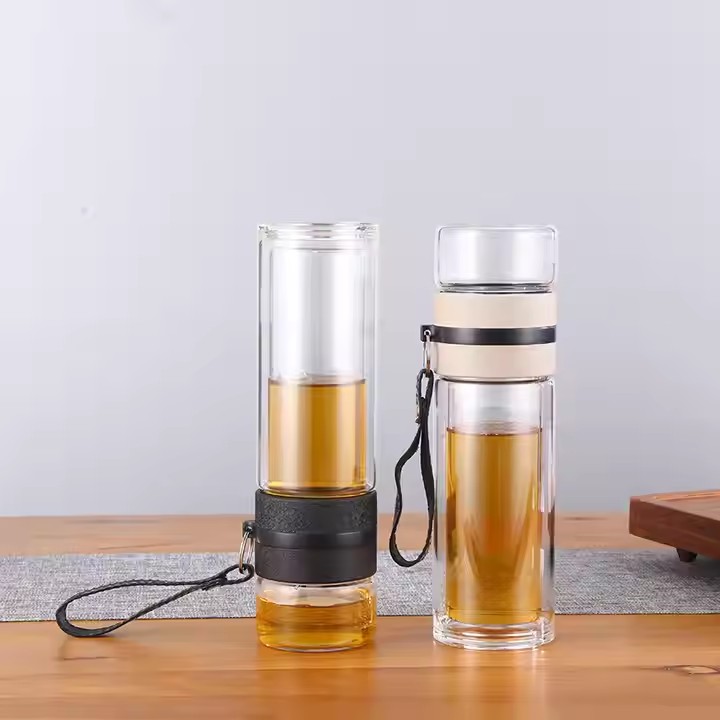Choosing a glass water bottle transforms your hydration habits into a sustainable lifestyle choice. You embrace an eco-friendly alternative that benefits both your health and the planet. Glass water bottles eliminate harmful chemicals, ensuring your water remains pure and refreshing. By opting for glass, you actively reduce plastic waste, contributing to a cleaner environment. This simple switch empowers you to make a positive impact every day. Let your choice inspire others to follow suit, creating a ripple effect of environmental consciousness and healthier living.
Key Takeaways
- Switching to a glass water bottle significantly reduces plastic waste, helping to protect marine life and keep our planet cleaner.
- Glass water bottles are non-toxic and BPA-free, ensuring that your hydration is safe and free from harmful chemicals.
- Investing in a glass water bottle is cost-effective in the long run, as it eliminates the need for frequent purchases of disposable plastic bottles.
- Glass preserves the pure taste of water, providing a refreshing drinking experience without any aftertaste.
- Choosing glass supports a sustainable manufacturing process that relies on abundant natural materials and energy-efficient techniques.
- Glass can be recycled infinitely without losing quality, making it a champion of sustainability and resource conservation.
- Using a glass water bottle not only benefits your health but also inspires others to make environmentally conscious choices.
Benefits of Glass Water Bottles

Environmental Benefits
Reduction in Plastic Waste
When you choose a glass water bottle, you take a significant step toward reducing plastic waste. Each time you refill your glass bottle, you prevent another plastic bottle from ending up in a landfill or the ocean. This choice helps protect marine life and keeps our planet cleaner. Your decision to use glass contributes to a healthier environment for future generations.
Lower Carbon Footprint
Glass water bottles have a lower carbon footprint compared to their plastic counterparts. The production process for glass is more energy-efficient, especially when recycled materials are used. By opting for glass, you support a sustainable cycle that reduces greenhouse gas emissions. Your choice makes a difference in combating climate change.
Health Advantages
Non-Toxic and BPA-Free
A glass water bottle offers a safe and non-toxic way to stay hydrated. Unlike plastic, glass does not contain harmful chemicals like BPA, which can leach into your drink. You can enjoy your water without worrying about ingesting toxins. This peace of mind enhances your overall well-being.
Preserves Water Taste
Glass preserves the pure taste of water. It does not absorb flavors or odors, ensuring that every sip is refreshing. You experience the true essence of your beverage, free from any aftertaste. This quality makes glass an ideal choice for those who appreciate the natural taste of water.
Durability and Reusability
Long-Lasting Material
Glass water bottles are built to last. They withstand daily use and resist wear and tear. With proper care, your glass bottle can serve you for years. This durability reduces the need for frequent replacements, making it a sustainable option.
Cost-Effective Over Time
Investing in a glass water bottle proves cost-effective over time. While the initial purchase may be higher than plastic, the long-term savings are substantial. You save money by not buying disposable bottles regularly. This investment benefits both your wallet and the environment.
How Glass Bottles Contribute to Sustainability
Lifecycle of Glass
Production and Raw Materials
You might wonder how glass water bottles begin their journey. The production process starts with abundant natural materials like sand, soda ash, and limestone. These raw materials are readily available and require minimal processing. By choosing glass, you support a manufacturing process that relies on sustainable resources. This choice helps preserve the planet’s natural beauty for future generations.
Energy Efficiency in Manufacturing
Manufacturing glass water bottles involves energy-efficient techniques. Factories often use recycled glass, which melts at lower temperatures than raw materials. This process reduces energy consumption significantly. When you opt for glass, you contribute to a cycle that prioritizes energy conservation. Your decision supports a cleaner, greener manufacturing industry.
Recyclability of Glass
Infinite Recycling Potential
Glass stands out for its infinite recycling potential. Unlike other materials, glass can be recycled endlessly without losing quality. Each time you recycle a glass water bottle, you help create new products without depleting resources. This endless cycle of reuse makes glass a champion of sustainability. Your choice to recycle glass contributes to a world where waste becomes a resource.
Closed-Loop Recycling Systems
Closed-loop recycling systems enhance the sustainability of glass. These systems ensure that recycled glass returns to the production line, reducing the need for new raw materials. By using a glass water bottle, you support a system that minimizes waste and maximizes resource efficiency. Your actions help create a sustainable loop that benefits the environment.
Reduction of Plastic Waste
Impact on Oceans and Wildlife
Plastic waste poses a severe threat to oceans and wildlife. By choosing a glass water bottle, you actively reduce plastic pollution. Each refill prevents another plastic bottle from harming marine life. Your decision protects the delicate balance of ocean ecosystems. You play a vital role in preserving the beauty and diversity of our planet’s waters.
Decreasing Landfill Contributions
Landfills overflow with plastic waste, but your choice can change that. Glass water bottles do not contribute to this growing problem. By opting for glass, you decrease the volume of waste sent to landfills. Your commitment to sustainability helps create a cleaner, healthier environment for everyone. You inspire others to follow your lead and make a positive impact.
Practical Considerations for Using Glass Water Bottles
When you decide to switch to a glass water bottle, several practical aspects come into play. Understanding these considerations helps you make an informed choice that aligns with your lifestyle and sustainability goals.
Cost and Investment
Initial Purchase Price
Initially, you might notice that glass water bottles cost more than plastic ones. This upfront investment reflects the quality and durability of the material. You pay for a product designed to last, offering you a reliable hydration solution.
Long-Term Savings
Over time, the investment in a glass water bottle pays off. You save money by avoiding the continuous purchase of disposable plastic bottles. This long-term financial benefit complements the environmental advantages, making your choice both economically and ecologically sound.
Weight and Portability
Comparing with Plastic and Metal
Glass water bottles tend to weigh more than plastic ones. However, they often weigh less than metal alternatives. This balance makes them a viable option for daily use. You enjoy the benefits of a sturdy container without the heft of some metal bottles.
Suitable for Various Activities
Despite their weight, glass water bottles suit a variety of activities. Whether you’re at the office, gym, or on a hike, they provide a stylish and functional hydration solution. You can choose designs with protective sleeves for added durability during active pursuits.
Care and Maintenance
Cleaning Tips
Keeping your glass water bottle clean ensures it remains a healthy choice. Use warm water and mild soap for regular cleaning. A bottle brush helps reach the bottom and corners. You maintain the purity of your water by following these simple steps.
Preventing Breakage
While glass is durable, it requires careful handling. Avoid dropping your bottle or exposing it to sudden temperature changes. Many bottles come with silicone sleeves that offer extra protection. By taking these precautions, you extend the life of your glass water bottle.
Choosing a glass water bottle marks a practical step toward sustainable living. You embrace a healthier lifestyle while contributing to environmental preservation. This simple switch offers numerous benefits, from reducing plastic waste to ensuring your water remains pure and refreshing. By opting for glass, you inspire others to follow your lead, creating a ripple effect of positive change. Your decision supports a cleaner planet and promotes well-being. Make the switch today and witness the impact of your choice on both your health and the environment.
FAQ
What makes glass water bottles eco-friendly?
Glass water bottles stand out as eco-friendly because they reduce plastic waste. Each time you refill your glass bottle, you prevent another plastic bottle from polluting the environment. Glass is also recyclable, allowing it to be reused indefinitely without losing quality. Your choice to use glass supports a sustainable cycle that benefits the planet.
Are glass water bottles safe for everyday use?
Yes, glass water bottles are safe for daily use. They do not contain harmful chemicals like BPA, which can leach into your drink from plastic bottles. Glass provides a non-toxic way to stay hydrated, ensuring your water remains pure and healthy.
How do I clean my glass water bottle?
Cleaning your glass water bottle is simple. Use warm water and mild soap for regular washing. A bottle brush helps reach the bottom and corners. This routine keeps your bottle hygienic and your water tasting fresh.
Can glass water bottles break easily?
While glass is durable, it requires careful handling. Avoid dropping your bottle or exposing it to sudden temperature changes. Many glass bottles come with silicone sleeves for added protection. By taking these precautions, you extend the life of your bottle.
Do glass water bottles affect the taste of water?
No, glass water bottles do not affect the taste of water. Glass preserves the pure taste of your beverage, free from any aftertaste. You enjoy the true essence of your drink with every sip.
Are glass water bottles heavy to carry?
Glass water bottles weigh more than plastic ones but often less than metal alternatives. This balance makes them suitable for daily use. You can choose designs with protective sleeves for added durability during active pursuits.
Is investing in a glass water bottle cost-effective?
Yes, investing in a glass water bottle proves cost-effective over time. While the initial purchase may be higher than plastic, the long-term savings are substantial. You save money by not buying disposable bottles regularly, benefiting both your wallet and the environment.
Can I use a glass water bottle for hot beverages?
Yes, you can use a glass water bottle for hot beverages, especially if it’s made from borosilicate glass. This type of glass resists thermal shock, making it suitable for various temperatures. Always check the manufacturer’s guidelines to ensure safe use.
How do glass water bottles contribute to sustainability?
Glass water bottles contribute to sustainability by reducing plastic waste and supporting recycling efforts. They have a lower carbon footprint compared to plastic bottles, especially when recycled materials are used in production. Your choice to use glass promotes a cleaner, greener planet.
Where can I buy a glass water bottle?
You can find glass water bottles at many retailers, both online and in stores. Look for brands that prioritize sustainability and offer features like silicone sleeves and bamboo lids. Your purchase supports eco-friendly practices and encourages others to make environmentally conscious choices.
Post time: Dec-17-2024


